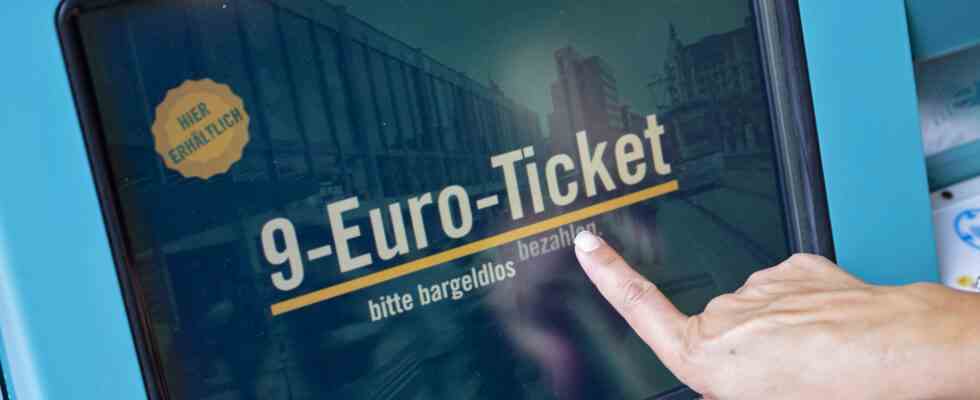Status: 07/23/2022 08:32 a.m
The demand for the 9-euro ticket is still enormous, but it expires at the end of August. There are still a few challenges to be overcome on the way to a successor model. Funding and schedule are still unclear.
Before its introduction, the 9-euro ticket caused a lot of skepticism – it is now considered a success because it has persuaded millions of people to switch to buses and trains. This means that customers can use local public transport comparatively cheaply throughout Germany. In June alone, more than 20 million €9 tickets were sold. There are also those who already had a public transport subscription and benefit from the lower price. In the discussion about a successor model, however, there are still several open points.
The price
It already seems clear: in the long term there will probably no longer be a nationwide local transport ticket for nine euros a month. This cannot be financed in the long term – “also in view of the sharp rise in energy, personnel and material costs for transport companies,” according to the Association of German Transport Companies (VDV). The VDV, which includes various regional transport companies, is therefore proposing a “climate ticket” for 69 euros per month.
Bavaria’s Prime Minister Markus Söder (CSU), on the other hand, has spoken out in favor of an annual public transport ticket for 365 euros, which would cost around 30 euros a month. In addition, there are also demands to simply extend the existing 9-euro ticket permanently at the current price.
The funding
The federal government is currently financing the additional costs for the 9-euro ticket as part of its energy relief package. For the months of June to August, the Federal Ministry of Transport expects costs totaling 2.5 billion euros.
How a successor model could be financed is currently still open. Federal Transport Minister Volker Wissing (FDP) sees the federal states on the train: “Now we have to see how the states want to finance it, because it is the task of the states to organize public transport,” said Wissing. With its proposal for a 69-euro ticket, the VDV expects additional costs “of around two billion euros” per year, but also emphasizes: “It won’t work without the federal government.”
Federal Minister of Finance Christian Lindner rejects further financing of the 9-euro ticket or a follow-up offer. “The 9-euro ticket is a temporary measure, just like the tank discount,” said the FDP leader to the newspapers of the Funke media group. “Therefore, neither a continuation of the tank discount nor funds for a follow-up regulation for the 9-euro ticket are planned in the federal budget.”
The Schedule
The 9-euro ticket will expire in just a few weeks on August 31st. A permanent successor model that then seamlessly connects to the current ticket seems unlikely. Because Federal Minister of Transport Wissing does not expect data on the experiences with the ticket until the beginning of November, on the basis of which a decision should be made about a successor.
From the beginning of 2023 there could be a nationwide public transport ticket again. However, there is no exact timetable for this. The VDV is stepping up the pace because the transport industry needs advance notice. The association proposes an extension of the 9-euro ticket for a transitional period of two months.
infrastructure
Even before the 9-euro ticket was introduced, there was a loud call for more investment in public transport. The higher number of passengers increases the pressure to act. It also becomes clear how different the problem situations are in urban and rural regions. While in the city the price is more of a factor in attracting road users to buses and trains, the low density and frequency of the transport network are the problem in the countryside.
This conflict of interest between town and country is illustrated by the different positions of the town and municipality association and the district council. While the Association of Towns and Municipalities advocates a successor model to the 9-euro ticket, the district council rejects such concepts – on the grounds that public funds for the expansion of public transport would be lacking. Transport companies, Deutsche Bahn and the federal government all emphasize the importance of investments in infrastructure.

